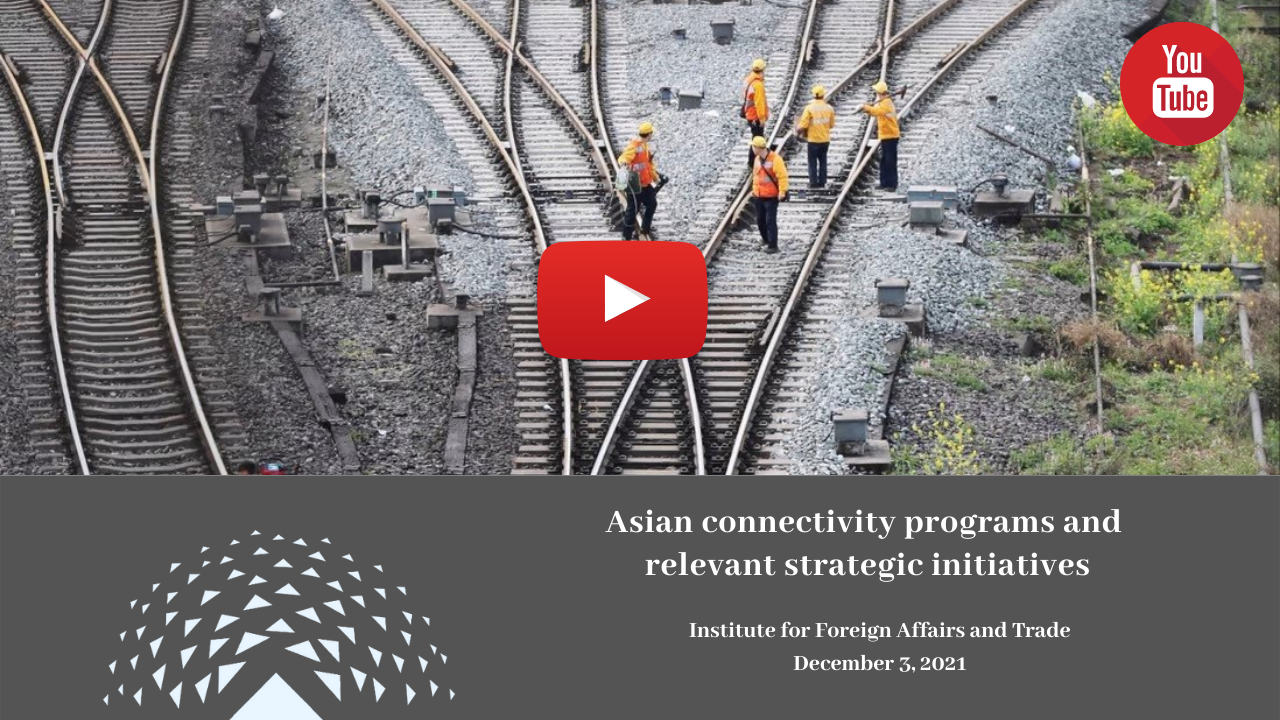On 3 December 2021, the Institute for Foreign Affairs and Trade (IFAT) held an online roundtable discussion on Asian connectivity programs and relevant strategic initiatives. Dr. Máté Szakáli, guest researcher of research Group for Modern East Asia at Pázmány Péter Catholic University and Dr. Viktor Eszterhai, senior research fellow at IFAT participated in the discussion. The event was moderated by Dr. Gergely Salát, senior analyst at IFAT.
Dr. Eszterhai analyzed the term connectivity from the great powers’ perspective and said that due to the globalization, great powers had to find new tools with which they can influence actions of other states, as the usage of classic military tools would be too expensive in our interconnected world. They use connectivity to unite regions where they create networks and asymmetric dependencies. Using connectivity as a strategy is a new phenomenon and probably leads to a new type of international system.
Dr. Szakáli agreed that by now interconnectivity has become a core element of international relations and that the new age of hyperconnectivity has already started. However, connectivity does not have a common definition, so different actors can have different understandings of it. Smaller countries can maximize their profits from this competitive situation by diversifying their investment sources to boost their own economic development.
Both analysts emphasized the importance of the Chinese connectivity program BRI (Belt and Road Initiative), which is the first comprehensively implemented connectivity initiative and which has a dramatic impact on international economic development. BRI is China’s tool to formulate the international environment and to help the development of other countries, at the same time it gives an impetus to its own modernization.
The emerging great power rivalry has made other powers to launch counterinitiatives, such as the Japanese—American Free and Open Indo-Pacific (FOIP), the Build Back Better World (B3W) of G7 countries and the Global Gateway of the EU. These programs can be interpreted as reactions to China’s assertiveness in foreign policy and attempts to enforce concerned countries to decouple from China. Experts emphasized that it would be beneficial for the Western powers to realize that connectivity programs could also complement each other and cooperation with China would be more productive for them. Western initiatives should also define more precisely what their programs connect exactly, and to enlarge the scope of their initiatives focusing now mainly on infrastructural development projects.
At the end of the session panelists answered questions regarding the future potential cooperation between EU and the Regional Comprehensive Economic Partnership (RCEP) and the potential effects of next year’s parliamentary elections on Sino-Hungarian relations.
For the full recording please click on the link below or visit our YouTube-channel!
JTNDaWZyYW1lJTIwd2lkdGglM0QlMjIxMDAlMjUlMjIlMjBoZWlnaHQlM0QlMjI0NTAlMjIlMjBzcmMlM0QlMjJodHRwcyUzQSUyRiUyRnd3dy55b3V0dWJlLmNvbSUyRmVtYmVkJTJGUFlySWwxYXRNUFklMjIlMjB0aXRsZSUzRCUyMllvdVR1YmUlMjB2aWRlbyUyMHBsYXllciUyMiUyMGZyYW1lYm9yZGVyJTNEJTIyMCUyMiUyMGFsbG93JTNEJTIyYWNjZWxlcm9tZXRlciUzQiUyMGF1dG9wbGF5JTNCJTIwY2xpcGJvYXJkLXdyaXRlJTNCJTIwZW5jcnlwdGVkLW1lZGlhJTNCJTIwZ3lyb3Njb3BlJTNCJTIwcGljdHVyZS1pbi1waWN0dXJlJTIyJTIwYWxsb3dmdWxsc2NyZWVuJTNFJTNDJTJGaWZyYW1lJTNF

